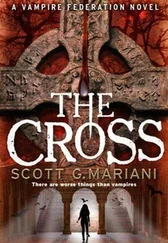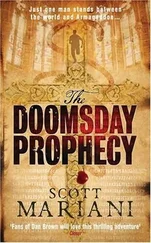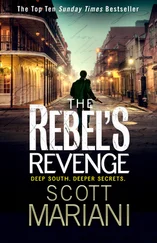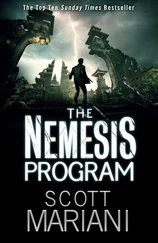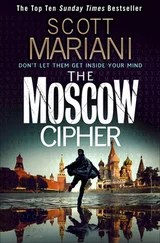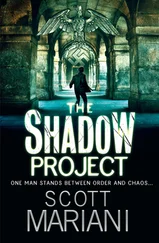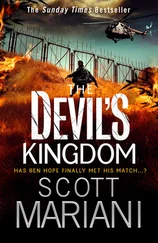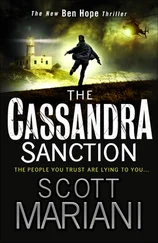Parked in a ring closer to the centre of the clearing was a cluster of open-topped Jeeps and a truck, around which stood a team of twenty or so heavily-armed men, all looking up intently at the chopper coming in to land.
The helicopter touched down. Serrato waited for the rotors to slow and the dust to settle, then stepped from the aircraft and straightened his suit. The immaculate beige silk struck a contrast against the jungle clothing of the men who walked across from the vehicles to greet him. Bracca sheathed his Bowie knife, grabbed his rifle from the floor of the chopper, and he and Vertíz jumped down after their boss to flank him, one either side, as they’d been doing for years.
‘Where’s Vargas?’ Serrato asked the ground team leader, Raoul.
‘They’re on their way, boss. Radioed in five minutes ago.’
Serrato nodded. ‘And so everything went as planned?’
‘Sure, boss.’ Raoul motioned behind him at the thick forest beyond the edge of the clearing. ‘All taken care of, just like you ordered.’
‘Was there any resistance?’
Raoul grinned. ‘Nothing we couldn’t handle.’
‘I want to see,’ Serrato said.
‘Sure, boss,’ Raoul repeated, but his words were drowned out by the buzzing approach of the second helicopter. They looked up, shading their eyes from the dazzling sun, as the bright red JetRanger appeared over the forest. Its pilot brought it carefully down to land thirty metres away across the clearing. The aircraft’s side hatch opened and a short, stocky, olive-skinned man in a rumpled white suit clambered down with some help from his aides, clutching at the rim of his Panama hat to keep it from flying off in the hurricane from the rotors. He waved to Serrato and crossed the razed earth towards him.
The man was in his fifties, with a cheerful round face that sported a carefully trimmed moustache and belied the fact that he was almost as calculating and ruthless as Serrato himself.
Almost, but not quite. His name was Aníbal Vargas, and he was a senior member of the Peruvian government’s Ministry of Housing, Construction and Sanitation, the department concerned, among other loosely defined matters, with the registration and administration of rural land deeds. He was also one of several men in the country who knew exactly with whom he was dealing in Ramon Serrato, and had no problem doing business as long as it was well away from the prying eyes of the press and the political reform activists who made his life far harder than he felt he deserved.
Vargas had amassed himself a small fortune during the last twenty years, massively augmenting his government salary by quietly and illegally offering concessions to oil, gas and logging operations willing to pay a premium kickback for the chance to sneak in and devastate great swathes of rainforest that were supposed to be protected in the interests of indigenous people. He’d always operated comfortably under the radar, shielded by the fact that Peru’s regulatory framework was weak, the infrastructure rotten, and the whole system generally so beleaguered by inefficiency and incompetence that neither the bureaucrats nor most of the public even cared any more.
As for the rainforest Indians themselves, aside from the occasional uprising against outsiders coming to plunder their ancient territories, their rights were as easily squashed in modern times as they’d been throughout history, going right back to the Conquistadors.
It was the same story in Peru as in Paraguay, Colombia, the whole tropical Amazon basin. In their time the Indians had been bribed, cheated, shot at, burned out of their homes, murdered wholesale, and their numbers ravaged by diseases contracted accidentally from outsiders – or sometimes introduced on purpose. The Natural Protected Areas Law of 1997 had made little real difference to their plight, although the steady growth of welfare organisations such as MATSES, the Movement in the Amazon for Tribal Subsistence and Economic Sustainability, was a pain in the butt for men like Aníbal Vargas and his colleagues, whose unofficial purpose it was to undo any progress they achieved.
‘You’re late,’ Serrato said.
Vargas was more at home in an air-conditioned office than in the middle of the jungle. He was already perspiring heavily as he stammered his apology, beating away the insects that swarmed around his face, drawn to the scent of fresh sweat. The heat didn’t bother Serrato. He was cool and calm. He said to Vargas, ‘Now let me show you what your department should have been doing.’
‘Are we going in there?’ Vargas asked, pointing at the jungle and thinking of venomous snakes and spiders as large as his hand that could scuttle up a trouser leg and sink their fangs into soft flesh. Serrato only nodded. Vargas lifted his hat to wipe the sweat from his balding scalp.
It was cooler under the trees. The jungle was strangely quiet, deserted by the hordes of howler monkeys and the many, many birds whose calls would normally fill the air. It was the silence of death.
The team leader went first with a couple of his men. Serrato followed, still closely flanked by Vertíz and Bracca who were eyeing every leaf and frond with suspicion, their loaded, cocked weapons at the ready. Vargas stumbled along in their wake, cracking twigs with every step and swatting at flies, and the rest of the ground team brought up the rear. Eighty yards into the dense, lush thicket, Serrato paused to peer at the shaft of an arrow embedded in the knotty bark of a tree.
‘Tricky little bastards,’ the team leader said with a knowing smile. ‘Handy with those fucking darts, too.’ He showed Serrato the hole above his breast pocket and tapped the lightweight Kevlar body armour underneath that was capable of turning a high-powered handgun bullet at point-blank range. ‘Lucky for us we came equipped.’
Serrato plucked the arrow out of the tree bark. A black, glutinous substance was still trickling from its barbed head. Poisons had always fascinated him. He wondered what rainforest plant or creature – a fish? A frog? – the Indians had concocted this from, and what its effects were. Maybe he’d experiment with it. He tucked the arrow under his arm like a swagger stick.
‘Remind me of the name of this tribe?’ Vargas said as they trudged through the heavy undergrowth.
‘Who gives a shit?’ Bracca rumbled, and the politician went quiet.
It was another thirty yards farther up the narrow machete-hacked path that they came to the first of the bodies. The corpse lying twisted across the path belonged to an older Indian male, maybe in his late thirties. He was short and stockily built with a shock of glossy black hair, almost naked except for a tiny loincloth and an arrow quiver. He was still clutching the shaft of his bow and the arrow he’d been about to loose when most of his head had been blown away by a bullet. Next to him lay the curled-up body of a teenage boy. White ribs were exposed where a shot had torn away the muscle and flesh of his side. His torso was slick with blood.
‘That one’s not dead,’ Vargas said, pointing. They all looked and saw that Vargas was right. The boy was moving weakly, trying to claw his way forwards over the bloody ground.
The team leader issued a short command. One of his men walked up to the dying teenager, unsnapped his belt holster and drew out a 9mm Beretta.
Serrato held up his hand. ‘No!’
The soldier lowered his pistol uncertainly.
Serrato took a couple of deliberate steps away. ‘The silk is so hard to clean,’ he explained to Vargas. Once he was out of range of any blood spray he nodded to the soldier and walked on. A moment later the flat report of the pistol cracked out. Serrato didn’t so much as glance back.
‘Dead now, all right,’ Vertíz chuckled, exchanging grins with the others. The government minister was looking pale.
Читать дальше
Конец ознакомительного отрывка
Купить книгу

